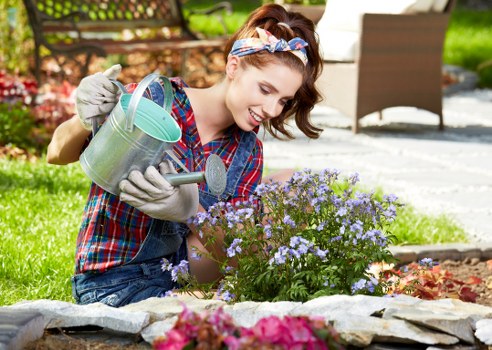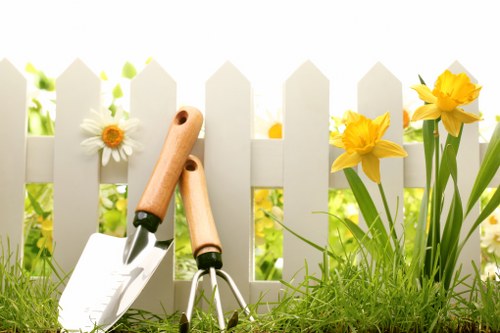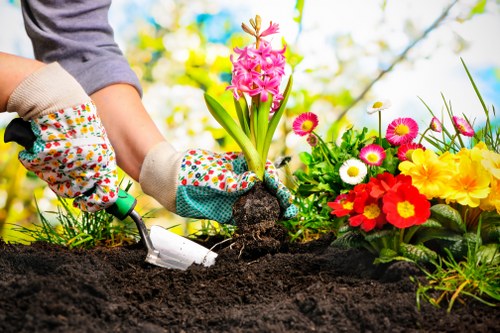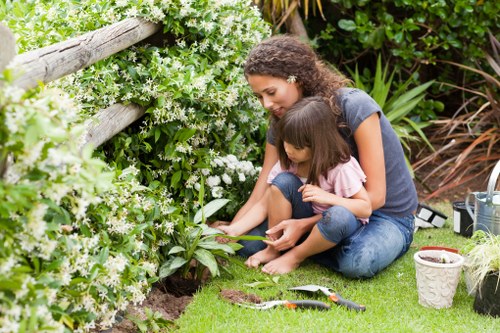Ultimate Guide to Garden Maintenance in Barnet
Introduction to Garden Maintenance

Maintaining a beautiful garden in Barnet requires a blend of knowledge, dedication, and the right techniques. Whether you’re a seasoned gardener or a beginner, understanding the specific needs of your garden can make all the difference.
Garden maintenance not only enhances the aesthetic appeal of your property but also contributes to a healthier and more sustainable environment. In Barnet, where the climate and soil conditions are unique, tailored maintenance strategies are essential.
This guide will walk you through the key aspects of garden maintenance in Barnet, offering practical tips and expert advice to help you cultivate a thriving outdoor space.
Seasonal Garden Maintenance

Different seasons bring different challenges and opportunities for garden maintenance. Adapting your care routine according to the season ensures that your garden remains vibrant throughout the year.
Spring Maintenance
Spring is a critical time for preparing your garden after the winter months. This involves pruning, planting new flowers, and preparing the soil for the growing season.
- Prune dead or overgrown branches
- Plant spring bulbs and annuals
- Fertilize the soil to promote healthy growth
Summer Maintenance
Summer requires consistent care to manage the heat and ensure plants receive adequate water. Regular weeding and pest control are also essential during this time.
- Water plants in the early morning or late evening
- Apply mulch to retain moisture
- Monitor for pests and diseases
Autumn Maintenance
Autumn is the time to prepare your garden for the cooler months. Clearing fallen leaves, planting perennials, and protecting sensitive plants are key tasks.
- Rake and compost fallen leaves
- Plant autumn-flowering plants
- Protect plants from frost
Winter Maintenance
Winter maintenance focuses on protecting your garden from harsh weather and planning for the next growing season. Pruning dormant plants and safeguarding delicate species are important steps.
- Prune trees and shrubs while they are dormant
- Cover delicate plants with frost cloths
- Plan and design your garden layout for spring
Essential Garden Tools

Having the right tools is fundamental to effective garden maintenance. Investing in quality equipment can save time and effort, making your gardening tasks more efficient.
Basic Tools Every Gardener Needs
- Spade: For digging and turning soil
- Pruning Shears: For trimming and shaping plants
- Garden Fork: For aerating soil and removing weeds
- Watering Can: For manual watering of plants
- Rake: For gathering leaves and leveling soil
Advanced Tools for Specialized Tasks
For more intricate gardening tasks, advanced tools can provide greater precision and efficiency.
- Lawn Mower: Essential for maintaining grass
- Hedge Trimmer: For shaping hedges and shrubs
- Wheelbarrow: For transporting soil, plants, and debris
- Garden Kneeler: To provide comfort while working close to the ground
- Soil Tester: For checking pH levels and nutrient content
Soil Preparation and Care

Healthy soil is the foundation of a thriving garden. Proper soil preparation and ongoing care ensure that your plants have the nutrients they need to grow strong and vibrant.
Testing and Amending Soil
Before planting, it’s important to assess the condition of your soil. Testing for pH levels and nutrient deficiencies can guide your amendments.
- Use a soil tester to determine pH levels
- Amend soil with compost to improve fertility
- Add lime or sulfur to adjust pH as needed
Mulching Techniques
Mulching helps retain moisture, suppress weeds, and regulate soil temperature. Choosing the right mulch can make a significant difference.
- Organic mulches like bark and straw enrich the soil as they decompose
- Inorganic mulches such as gravel and plastic can provide permanent solutions
- Apply a layer of 2-3 inches around plants
Composting for Garden Health
Composting converts kitchen scraps and garden waste into valuable organic matter that improves soil structure and fertility.
- Start a compost pile in a shaded area
- Add a mix of green and brown materials
- Turn the pile regularly to aerate
Plant Selection and Care

Choosing the right plants is crucial for a successful garden in Barnet. Consider the local climate, soil conditions, and the specific needs of each plant.
Choosing Native Plants
Native plants are well-adapted to the local environment, making them easier to maintain and more resilient against pests and diseases.
- They require less water and fertilizer
- Provide habitat for native wildlife
- Promote biodiversity
Perennials vs. Annuals
Understanding the difference between perennials and annuals can help you plan a garden that blooms year after year.
- Perennials: Come back every spring, such as lavender and peonies
- Annuals: Complete their lifecycle in one season, like marigolds and petunias
- Combine both for continuous color and variety
Vegetable and Herb Gardening
Growing your own vegetables and herbs can be rewarding and sustainable. Proper planning and care are essential for a productive garden.
- Choose varieties suited to Barnet’s climate
- Ensure adequate sunlight and watering
- Practice crop rotation to prevent soil depletion
Pest and Disease Management
Effective pest and disease management is vital for maintaining a healthy garden. Using integrated pest management (IPM) strategies can minimize damage without harming the environment.
Identifying Common Pests
Recognizing the signs of pest infestations early can prevent extensive damage to your plants.
- Aphids: Cause distorted growth and transmit diseases
- Slugs and Snails: Feed on leaves and stems
- Japanese Beetles: Defoliate plants quickly
Natural Remedies and Treatments
Using natural methods to control pests reduces the need for chemical interventions.
- Introduce beneficial insects like ladybugs
- Use neem oil or insecticidal soap
- Implement companion planting to repel pests
Disease Prevention and Control
Preventing plant diseases involves good garden hygiene and proper plant care.
- Space plants adequately to ensure good air circulation
- Remove and dispose of infected plant material
- Use resistant plant varieties when available
Irrigation and Water Management
Efficient water use is crucial, especially during dry spells. Proper irrigation techniques ensure that plants receive the right amount of water without wastage.
Choosing the Right Irrigation System
Various irrigation systems cater to different garden sizes and types. Selecting the appropriate system can enhance water efficiency.
- Drip Irrigation: Delivers water directly to the plant roots
- Sprinkler Systems: Suitable for lawns and larger garden areas
- Soaker Hoses: Ideal for vegetable gardens and flower beds
Water Conservation Tips
Conserving water not only benefits the environment but also reduces your utility bills.
- Water plants during the early morning or late evening
- Use mulches to retain soil moisture
- Collect and use rainwater for irrigation
Timing and Frequency of Watering
Understanding the specific watering needs of your plants helps in maintaining their health and preventing overwatering.
- Deep watering encourages strong root growth
- Avoid frequent shallow watering
- Adjust watering schedules based on seasonal changes
Lawn Care in Barnet
A well-maintained lawn can significantly enhance the overall look of your garden. Proper lawn care involves mowing, fertilizing, aerating, and dealing with common lawn issues.
Mowing Techniques
Mowing is more than just cutting grass; it plays a role in the health and appearance of your lawn.
- Maintain the grass at the recommended height
- Use sharp blades to ensure clean cuts
- Mow regularly to prevent overgrowth
Fertilizing Your Lawn
Fertilizing provides essential nutrients that promote lush and green grass.
- Choose the right type of fertilizer based on your grass type
- Apply fertilizers during the growing seasons
- Follow application instructions to avoid over-fertilization
Aeration and Overseeding
Aerating the lawn improves soil structure and allows air, water, and nutrients to reach the roots more effectively.
- Aerate the lawn in spring or fall
- Overseed to fill in bare patches and enhance turf density
- Water the lawn after aeration and overseeding
Dealing with Lawn Pests and Diseases
Keeping your lawn free from pests and diseases ensures its longevity and beauty.
- Identify and treat common pests like grubs and chinch bugs
- Use fungicides to manage lawn diseases
- Maintain proper lawn care practices to prevent issues
Hardscaping and Garden Structures
Incorporating hardscaping elements such as paths, patios, and fences can add functionality and visual interest to your garden.
Designing Garden Paths
Paths guide visitors through your garden and can highlight key features. Choosing the right materials and layout is essential.
- Use natural stone, gravel, or brick for durable paths
- Design winding paths to create a sense of exploration
- Line paths with lighting or plants for added charm
Building Patios and Decks
Patios and decks provide space for outdoor gatherings and relaxation. Proper design ensures they complement your garden.
- Select materials that match your garden’s aesthetic
- Ensure adequate drainage to prevent water pooling
- Incorporate seating and shading options
Fencing and Privacy Screens
Fences and privacy screens create boundaries and offer protection from wind and noise.
- Choose durable materials like wood, metal, or vinyl
- Install trellises for added greenery and support
- Consider height and style to match your garden’s needs
Garden Lighting
Lighting enhances the beauty of your garden at night and adds security. Strategic placement highlights focal points and pathways.
- Use solar-powered lights for eco-friendly illumination
- Install spotlights to highlight trees and sculptures
- Incorporate string lights for a festive atmosphere
Professional Garden Maintenance Services
While DIY garden maintenance is rewarding, professional services in Barnet can provide expertise and save you time. Hiring professionals ensures that your garden receives the best care possible.
Benefits of Hiring Professionals
- Access to specialized knowledge and expertise
- Efficient and timely maintenance
- Customized care plans tailored to your garden’s needs
Services Offered
Professional garden maintenance services encompass a wide range of tasks to keep your garden in top condition.
- Regular mowing and trimming
- Planting and landscaping
- Soil testing and fertilization
- Pest and disease management
- Seasonal clean-ups and preparations
Choosing the Right Service Provider
Selecting a reputable garden maintenance service in Barnet involves considering several factors.
- Check for licenses and certifications
- Read reviews and seek recommendations
- Request quotes and compare services
- Ensure they use eco-friendly practices

